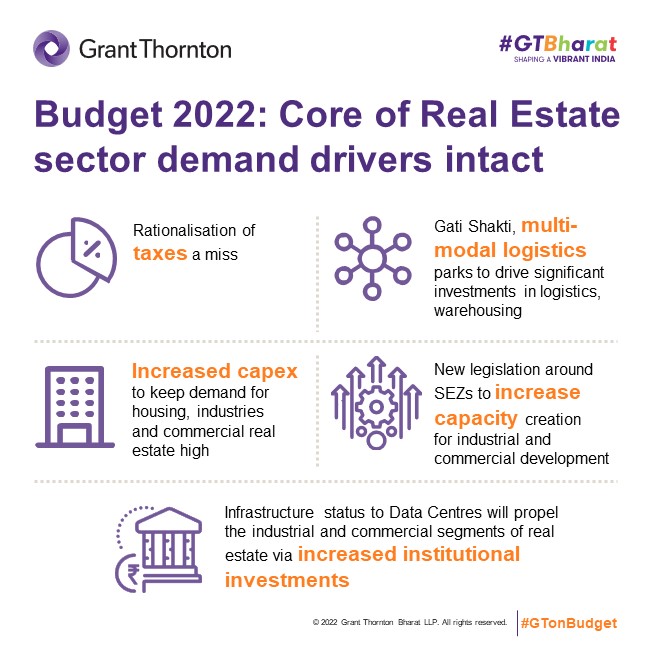-
Business Consulting
Our business consulting specialists offer a comprehensive blend of strategic advisory services. We assess the business, industry, operating model, synergy, skill sets and vision of the organisation and recommend the way forward
-
Digital Transformation Services
Grant Thornton’s digital transformation services help traditional businesses digitalise their business models with cloud technology, IoT consulting, app development and more DigiTech solutions.
-
Human Capital Consulting
Our Human Capital Consulting team harnesses technology and industry expertise to assist in constructing adaptable organisations with transparency, fostering productive and value-driven workforces, and inspiring employees to engage meaningfully in their tasks.
-
Production Linked Incentive Scheme
Production-linked Incentive Scheme by the Indian government is aimed at boosting manufacturing. Grant Thornton Bharat offers varied services across sectors to help businesses avail of this scheme.
-
Public Sector Advisory
Our Public Sector Advisory team has focused streams, aligned with the core priorities of the Government of India. We are responsible for providing innovative and customized technical and managerial solutions.
-
Tech Advisory
We have amalgamated Digital Transformation, IT Advisory & Information Management and Analytics into a new offering, DigiTech.
-
Direct Tax services
Our tax specialists offer a comprehensive blend of tax advisory, tax litigation, regulatory and compliance services, helping you navigate through complex business matters.
-
Indirect Tax Services
Get tax advisory service by leading tax firm Grant Thornton India. Our indirect tax services include advisory, compliance and litigation services for corporate, international and transaction tax
-
Transfer pricing services
Our transfer pricing services experts provide a range of services from provision of APA services to handling large global assignments including Country by Country reporting.
-
US Tax
At Grant Thornton, we help individuals and dynamic companies deal with US tax laws, which are one of the most complicated tax legislations across the world.
-
Financial Services - Tax
Best financial advisory services, tailored for small and large businesses by the experts having comprehensive knowledge of domestic laws and access to multifaceted tools to provide a valuable results.
-
Financial Reporting consulting services
Our experts have significant hands-on experience in providing IFRS/US GAAP services, end-to-end solutions and support services to fulfil financial reporting requirements.
-
Fund accounting and financial reporting
International operations often lack standardisation and have varied local reporting formats and requirements. Our experts can offer proactive insights, practical guidance, and positive progress and help meet regulatory timeframes.
-
Compliance and Secretarial Services
Our experts can assist in overhauling the entire compliance machinery of the organisation through evaluation of the applicable statutory obligations, monitoring of adequate governance controls, reporting and providing ongoing support.
-
Global People Solutions
As businesses transcend borders, both domestic and global considerations need equal attention. Our interim CFO and financial controller support services help organisations meet the business vision.
-
Finance and accounting outsourcing
Our accounting experts assist organisations in managing their accounting and reporting. Our dedicated Integrated Knowledge and Capability Centre (IKCC), allows us to service both the domestic and global markets efficiently and cost-effectively
-
Compliance Management System
We have automation solutions for you that will allow meeting government requirements and remain diligent, which when failed, can lead to penalties and loss in revenue.
-
IKCC: Grant Thornton's Shared Service Centre
The India Knowledge and Capability Centre (IKCC), aimed at delivering solutions by developing capabilities, has completed four years of its journey.
-
Global compliance and reporting solutions
At Grant Thornton Bharat, we meet the challenges of our clients and help them unlock their potential for growth. Our professionals offer solutions tailored to meet our clients’ global accounting and statutory reporting requirements. With first-hand experience of local reporting requirements in more than 145+ locations worldwide, we provide seamless and consistent international service delivery through a single point of contact.
-
Related Party Transactions Governance
Related Party Transactions Governance
-
Private Client Services
Private Client Services
-
Labour codes
Labour codes solutions help you transition through the new legislation. At Grant Thornton, we help businesses divide their approach to make sure a smooth transition.
-
Alerts
At Grant Thornton India, with the help of our tax alerts, we help to provide updates on how to minimise your tax exposure and risks.
-
Cyber
In today’s time, businesses have gone through large transformation initiatives such as adoption of digital technologies, transition to cloud, use of advanced technologies et al.
-
Governance, Risk & Operations
Our Governance, Risk and Operations (GRO) services encompass Internal Audit, Enterprise Risk Management, Internal Financial Controls, IT advisory, Standard Operating Procedures and other services.
-
Risk analytics
Grant Thornton Bharat’s CLEARR Insights is a state-of-the art data analytics platform that will help you in seamless data analysis and efficient decision-making.
-
Forensic & Investigation Services
The team of forensic advisory services experts consists of the best intelligence corporate experts, and fraud risk, computer forensic experts to deliver most effective solutions to dynamic Indian businesses.
-
ESG consulting
Grant Thornton Bharat offers holistic ESG consulting solutions for sustainable business outcomes. With industry expertise and AI technology, we drive long-term value.

-
Transaction Tax Services
Our transaction tax experts understand your business, anticipate your needs and come up with robust tax solutions that help you achieve business objectives ensuring compliance and efficiency
-
Deal Advisory
Unlike other M&A advisory firm in India, we offer deal advisory services and work exclusively with controlled and well-designed strategies to help businesses grow, expand and create value.
-
Due Diligence
Grant Thornton’s financial due diligence services are aimed at corporate looking for mergers and acquisitions, private equity firms evaluating investments and businesses/promoters considering sale/divestment.
-
Valuations
As one of the leading valuation consultants in India, Grant Thornton specializes in all the aspects of the process like business valuation services, financial reporting, tax issues, etc.
-
Overseas Listing
Overseas listing presents a perfect platform for mid-sized Indian companies with global ambitions. Grant Thornton’s team of experts in listings, work closely with clients during all stages.
-
Debt & Special Situations Solutions
Grant Thornton Bharat offers specialist debt and special situations consulting services, including restructuring, insolvency, and asset tracing solutions.
-
Financial Reporting Advisory Services
Financial Reporting Advisory Services
-
Financial Statement Audit and Attestation Services
Financial Statement Audit and Attestation Services

- Agriculture
- Asset management
- Automotive and EV
- Aviation
- Banking
- Education and ed-tech
- Energy & Renewables
- Engineering & industrial products
- FinTech
- FMCG & consumer goods
- Food processing
- Gaming
- Healthcare
- Urban infrastructure
- Insurance
- Media
- Medical devices
- Metals & Mining
- NBFC
- Pharma, bio tech & life sciences
- Real estate and REITs
- Retail & E-commerce
- Specialty chemicals
- Sports
- Technology
- Telecom
- Transportation & logistics
- Tourism & hospitality
-
India-UK
India-UK

For the real estate sector, Budget 2022-23 seems to rely on demand-supply market dynamics to drive growth in the coming fiscal, with a hope that the gains of the structural reforms set in motion over the last 5 years, will continue to keep the second largest employer after agriculture in momentum. The sector has been buoyant in 2021 resulting in falling inventory levels across markets and increased stamp duty collections across major states, signaling visible results of the string of budgetary initiatives since 2018, across segments of REITs, affordable housing, exemptions on capital gains and improved developer funding. The theme of this budget for real estate is consistent with the overall theme of keeping the core of the economy energised with higher government spending versus direct sops to sectors which have been riding a 4-5-year cycle of structural reforms.

The Finance Minister has steered clear of popular industry expectations of further rationalisation of tax regime in the form of GST relaxation towards under construction properties, reduction in key items of raw materials, granting of infrastructure status, and a bigger interest exemption for home buyers. The Budget has managed to keep the core of the sector demand drivers intact through a mix of direct and consequential benefits derived from creation of related infrastructure. Echoing the same sentiments, a pre-budget survey undertaken by Grant Thornton Bharat, 78% respondents said they are expecting an increase in the limit for tax exemption on housing loan interest to boost consumption.
The Prime Minister’s Gati Shakti and other government’s announcements to set up multi-modal logistics parks to connect urban transport to railways, will drive significant investments in logistics and warehousing. The Infrastructure status to Data Centres will propel the industrial and commercial segments of real estate through increased institutional investments. The proposed new legislation around Special Economic Zones (SEZs) should lead to increased capacity creation for industrial and commercial development. This is further expected to accelerate the real estate investment trust (REIT) story, with the emergence of sizable industrial and commercial assets. With continued focus on demand fulfilment in the affordable housing category, the INR 48,000 crore incentive for this segment will ensure the momentum of Pradhan Mantri Awas Yojana (PMAY) and a range of initiatives for providing affordable housing in the preceding budgets is not lost. The government has also maintained its long-term commitment for supporting creation of smart and sustainable real estate across Tier 2 and 3 cities, by establishing centres of excellence for urban planning.
The budget also seems to bank on the strong inter dependency of real estate with overall economy. The increase in government capital expenditure by 35% over FY22 budget estimates of INR 5.5 lakh crore to INR 7.5 lakh crores will continue to push all engines of the economy, and the real estate sector in particular, by keeping demand for housing, industries and commercial real estate high. It can, however, be argued that for a sector directly impacted by hardening interest rates, which is the likely outlook for FY23, the sector would have felt more reassured with direct support coming in from the budget as against the largely structural support approach seen in this budget.